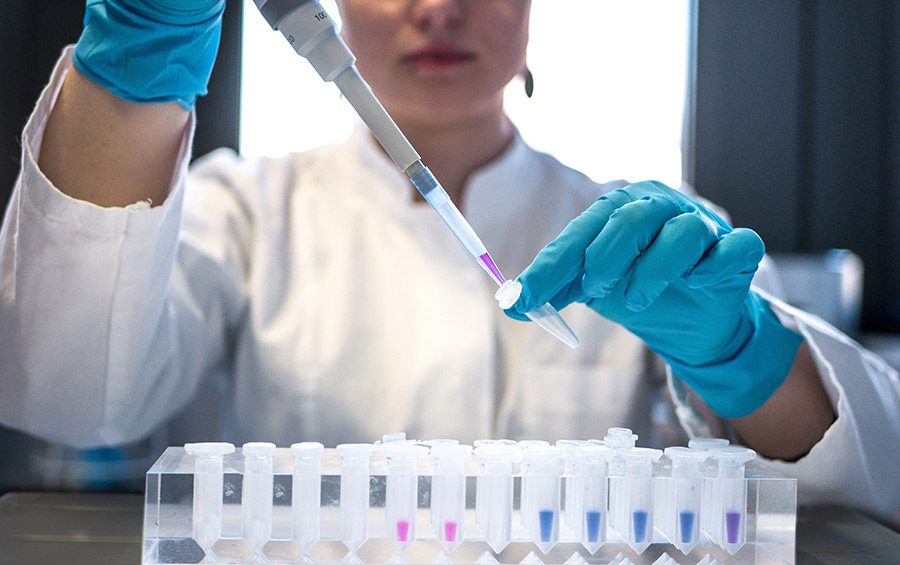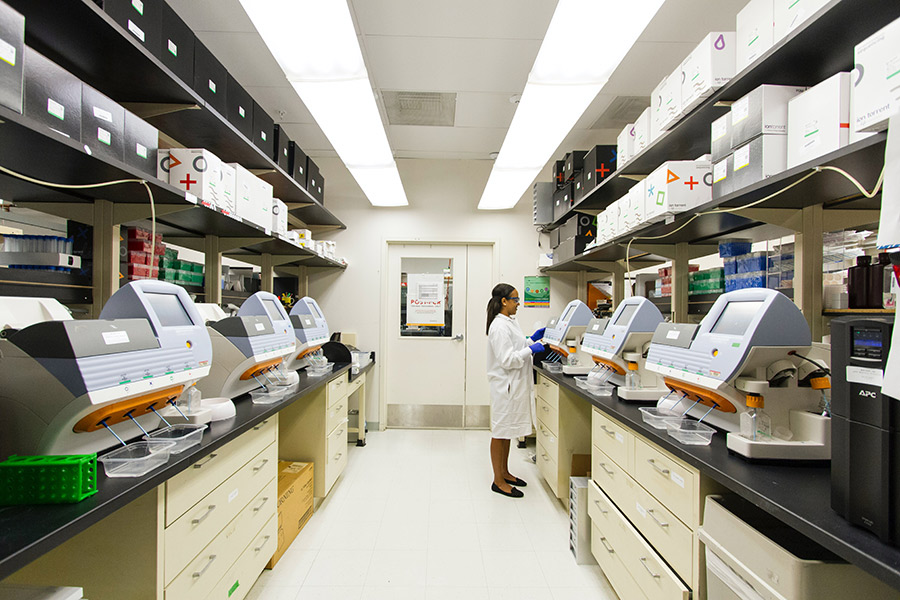What Does a Biochemist Do? A Complete Guide to the Lucrative Career

The biopharmaceutical industry is widely expanding throughout Ireland, and positions are readily available for those who are ready to set foot in it.
One of the most fascinating careers you can pursue is that of a biochemist.
Here’s a rundown of what a biochemist does, what the day-to-day roles and responsibilities include, and how to become one.
What Is Biochemistry and Why Is It Important?
Biochemistry itself is a subset of science. It pertains to the study of chemical and biological sciences combined. Within the field, scientists study how chemical elements interact with biological systems at a cellular and molecular level.
Why Is Biochemistry an Important Field to Enter?
Biochemistry is one of the most important fields to study and pursue a career in as it’s often the foundation of many medical positions. It involves the study of chemical substances and how they interact with living organisms, such as the human body; biochemists are crucial to the pharmaceutical industry.
If you have a zest for life and a passion for science, then becoming a biochemist may be the right career path for you!
What Does a Biochemist Do?
A biochemist is a scientist who has a degree in biochemistry, chemistry, or biology. These professionals are usually lab-based, meaning they spend the majority of their day carrying out their biochemist responsibilities within a science lab.
Their main objective is to study and discover how chemical products and processes impact living organisms.
Many biochemists work for businesses in the pharmaceutical industry to help them develop modern medicines and medical devices.
What Does the Role of a Biochemist Look Like Day-to-Day?
When it comes to what a biochemist does, the daily tasks vary depending on the project one is working on and what company they’re working for.
However, you can expect a biochemist’s responsibilities to typically include:
- Planning and conducting experiments and scientific research in the laboratory
- Taking samples from specimens
- Monitoring, recording, and reviewing results from experiments
- Creating and writing reports to present to upper management
- Analysing reports and offering presentations of experimental results
- Identifying and troubleshooting any problems with laboratory equipment
Depending on the company a biochemist works for, they may also work directly with manufacturing processes. This is usually the case for those working within a medical device company.
If you opt to take on a position at a medical device company, then additional biochemist duties might include:
- Communicating and working closely with team members within the manufacturing process
- Experimenting with quality control for medical devices created
- Testing products and advanced technologies for safety and internal and external regulations
And in non-entry level positions, biochemists may be required to oversee and manage junior staff members or laboratory teams as well.
What Is the Salary Range for Biochemists in Ireland?
A position as a biochemist is often a lucrative path to take. The average salary of an entry-level biochemist is close to €55,000. An entry-level biochemist is usually someone who has 1-3 years of experience.
Those who are in senior positions, often with 8 years of experience or more, make roughly €97,000 annually. The average salary for biochemists in mid-tier positions is around €78,000.
The great news is as the biopharmaceutical industry continues to expand, the average salary range for these positions is expected to continue to increase.
How Long Does It Take to Become a Biochemist?
How long it takes to become a biochemist depends on the level of education you already possess or plan to pursue.
There are entry-level positions that only require a four-year bachelor’s degree to be eligible for them. However, if your chosen career path is more advanced, you can continue your education and training by pursuing a master’s degree or even a doctorate in biochemistry or biophysics.
Where Does a Biochemist Work?
Biochemists typically work within a science laboratory. Within the labs, they’re required to adhere to standard safety regulations and procedures. They’re also more than likely required to wear protective gear, such as safety glasses and lab coats.
It’s within the laboratory that you’ll conduct the majority of your experiments. It’s also the location where you’ll write down any findings or discoveries.
In most locations, biochemists aren’t required to do any strenuous activity or lift heavy objects. However, as you work in the laboratory, you may be on your feet throughout the day.
There will be other times when you may be required to work outside of the laboratory. This may be the case when you’re compiling your research, reviewing reports, or making any presentations for upper management. In these scenarios, you may be working at a desk or spending part of your day in a conference room.
How to Become a Biochemist?
Becoming a biochemist is a process and requires a fair amount of determination and commitment.
While there are multiple ways to go about getting to the role of a biochemist, there are a few things that remain constant. Those typically include your educational qualifications and the skills you’ve developed from both your educational background and any work experience.
Educational Qualifications Needed to Become a Biochemist
To become a biochemist, you’ll at least need a four-year bachelor’s degree in an applied science field. That might look like a degree in physics, biophysics, chemistry, biochemistry, or biology.
The courses you take to obtain your bachelor’s degree lay the foundation for many of the biochemist responsibilities.
If you don’t have a bachelor’s degree in a related field, but you’re looking to transition into the industry, then you may want to look into study programs. These often include certifications that fill the gap between your current knowledge and skills levels and what you need to succeed in the work environment.
After you have completed a bachelor’s degree, you can apply for entry-level positions. However, if you still want to continue your education so you can land higher-level positions, that’s a career path you can take. This is especially the case if you want to work in an independent research and development position. These roles often require a doctoral degree.
One of the best things you can do for your career path, however, is finish your bachelor’s degree, first. Then, obtain an entry-level position as a biochemist. Use your career to garner work experience, and then continue your biochemist education with postgraduate studies.
This will ensure you set yourself apart from the competition when you apply for higher-level positions.
Skills Needed
You’ll find that the majority of biochemist job descriptions include hard and soft skills. As you complete your biochemist education, you’ll learn the hard skills needed to do your job successfully.
That often includes things like:
- Conducting research and operating important scientific equipment
- Compiling research findings and results into reports
- Creating reports and presentations for upper management
You’ll also hone soft skills during your educational training and work experiences. However, you can always start working on these skills in your spare time, as well.
Soft skills for biochemists include:
- Analytical and logical skills
Biochemists need to have an analytical mindset as they conduct experiments and research. As biochemistry is an applied science field, analysing data with accuracy is crucial.
- Critical thinking skills
This goes along with analytical skills. Biochemists need to review and analyse data and come to conclusions about their results and findings. Your sound reasoning and judgement determine whether or not products like medical devices or medicines are healthy for humans and other living organisms.
- Communication skills
Even if you’re working on a biochemistry team of just you, you’ll still need to report your results to upper management. That in and of itself requires effective communication skills so nothing is misunderstood.
- Patience
Work in the biochemistry field is often slow. There aren’t many fast results, and even if there are fast results, the process of discussing it with other team members and upper management can slow everything down. Not to mention, it can take a lot of time to see the results you’re hoping to see within your experiments. Having patience and perseverance as a biochemist is necessary.
- Time-management skills
As you work on a team and as you conduct research and experiments, you’ll be required to meet deadlines. Managing time and learning how to prioritise tasks while working under pressure is a skill that would benefit you to develop.

How Can Innopharma Help You
If the work of a biochemist sounds intriguing to you then we can help you get started on your career path in the field. Through degree programmes and postgraduate studies, we can help you take your first steps into the field, transition into the biochemistry field, or advance your career.
All of our programmes are designed to lay the foundation for the required skills needed to work in the biopharmaceutical and biochemistry fields. You’ll upskill in clinical research, understand scientific systems and regulations, and learn how to analyse scientific research appropriately.
For those looking to upskill after completing their bachelor’s degree, Innopharma offers a certificate programme to help you enter into the pharmaceutical and medical device operations industry as a biochemist.
Your choice of education paths at Innopharma that can lead to a career as a biochemist include:
- Higher diploma in Biopharmaceutical and Medical Device Manufacturing
- Certificate in Pharmaceutical and Medical Devices Operations
- Degree in Pharmaceutical Business Operations
- Post-graduate diploma in Pharmaceutical Business and Technology
- Honours degree in Pharmaceutical Business Operations
- Master’s degree in Pharmaceutical Business and Technology
Ultimately, the first step toward entering the field starts with an excellent education.
Get started with an Innopharma programme to help you start your career as a biochemist!



















